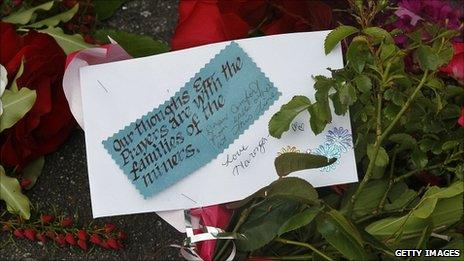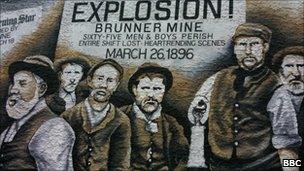New Zealand town of Greymouth steeped in grief for miners
- Published

Civic leaders in the small New Zealand town touched by the country's worst mining disaster in almost a century say the Pike River colliery near Greymouth should eventually be reopened, despite the deaths of 29 men.
They went missing after a gas explosion last Friday thundered through the drift mine, carved deep into the tree-covered Paparoa Ranges.
The police say a second blast five days later killed off hopes that any survivors would be found, while the government is to set up a commission of inquiry.
The district mayor, Tony Kokshoorn, said the confirmation that so many lives had been lost was Greymouth's "darkest hour", but has told the BBC that the mine should be brought back into service.
"A big part of our economy on the west coast is coal and, yes, we want our men back down the mine working because there is a lot of employment and money that ripples through. So, we want them there but we want them in a safe environment."
"We are relying on a quick turnaround in the inquiry to find out exactly what went wrong," Mr Kokshoorn said.
This isolated corner of New Zealand's rugged South Island will always be scarred by what has been a catastrophic reminder of the perils of working deep underground.
"Coal mining inherently will never be 100% safe. It is impossible," Mr Kokshoorn added. "Us coasters live with that and that is why when you look around the west coast there are many cemeteries with mass graves."
The most pressing task for the authorities is to bring the bodies of the fallen to the surface - but with levels of poisonous and combustible gases still dangerously high, the grim retrieval is likely to take weeks, even months, prolonging the pain for the miners' families.
Sad procession
They have gathered at a town centre gymnasium in Greymouth to meet New Zealand's Prime Minister, John Key, who promised that neither they nor their loved ones would be forgotten.
This group of ordinary people have become mostly unwilling central characters in a national tragedy, and they stayed close to each other, with hands held tightly, as they made their way into the building.
It was a sad procession, and while the grief may eventually subside, the memories of this terrible week may never fade.
Mr Key said there was an "awful lot of sorrow" in the room but no hostility from relatives who have previously expressed anger at the refusal of the emergency authorities to send emergency teams into the mine because of safety concerns over the build up of deadly methane and carbon monoxide.
It is understood that families have been urged by community leaders not to vent their frustrations during this period of intense grief.

The mayor of Greymouth says coal mining is an important employer in the region
But it seems inevitable that along with various official investigations, recriminations will follow as the question is again asked - could and should the rescue mission have done more to save the men?
The second blast that tore through the Pike River facility does appear, however, to justify the cautious approach taken by the police, which co-ordinated the rescue mission.
It was, according to senior officers, always a delicate and dangerous operation that simply could not be rushed.
Unlike the joyful scenes in the Atacama Desert when 33 Chilean miners were rescued in October, Greymouth's mine emergency has ended in utter disaster.
Most of the victims were New Zealanders, while others were from Scotland, Australia and South Africa.
The British Royal family, including the Queen and Prince Charles, along with Pope Benedict, have sent messages of condolence.
John Key said such words of support were "enormously comforting".
"Last night the British Prime Minister (David Cameron) rang," he told reporters in Greymouth.
"In the end for the people who have lost their loved ones down the mine, nothing is going to bring them home, but the knowledge that leaders around the world care so deeply is extremely reassuring."
- Published25 November 2010
- Published24 November 2010
- Published24 November 2010
- Published24 November 2010
- Published24 November 2010
- Published24 November 2010
- Published14 October 2010